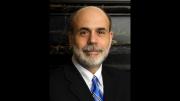Ben S. Bernanke ’75, former chair of the Board of Governors of the Federal Reserve System, today shared the Nobel Prize in economics with two other scholars of banking and financial crises. The honor—formally, the Sveriges Riksbank Prize in Economic Sciences in Memory of Alfred Nobel 2022—was conferred on Bernanke, who is now at the Brookings Institution; Douglas W. Diamond, of the University of Chicago; and Philip H. Dybvig, of Washington University, St. Louis. According to the news announcement, their scholarship has “significantly improved our understanding of the role of banks in the economy, particularly during financial crises. An important finding in their research is why avoiding bank collapses is vital.”
As The New York Times reported, Bernanke’s research informed his leadership of the Federal Reserve Board during the Great Recession of 2008-2009. Having beeen appointed chair in 2006, as the housing market began to collapse and “overextended borrowers fell behind and defaulted on their mortgages, and a pile of risky mortgage debt that had been sliced, diced and parceled out across big banks and the broader financial system began to drag down institutions and break the gears of finance,” Bernanke and the Fed faced a potentially severe depression.
Bernanke, the newspaper continued, “who received a Ph.D. in economics from the Massachusetts Institute of Technology and who taught at Princeton University before coming to the Fed as a governor in 2002, drew upon his research about the Great Depression to try to stem the fallout. He worked with colleagues to set up emergency programs that backstopped various markets on the brink of collapse, from short-term business debt to securitized loans. And alongside the Treasury Department, he used the Fed’s powers to enable bailouts for bank and insurance company portfolios.”
Bernanke has been a frequent guest on campus in recent years. In 2008, while he was Fed chair, he delivered the Class Day speech, available here. Recalling the speaker in at his own Commencement in 1975, social critic and comedian Dick Gregory, Bernanke said his predecessor “was inclined toward the sharp-edged and satiric. Central bankers don’t do satire as a rule, so I am going to have to strive for ‘kind of interesting.’”
He is the second College graduate to share a Nobel Prize this year. Carolyn R. Bertozzi ’88 shared the prize in chemistry with two other scientists.









